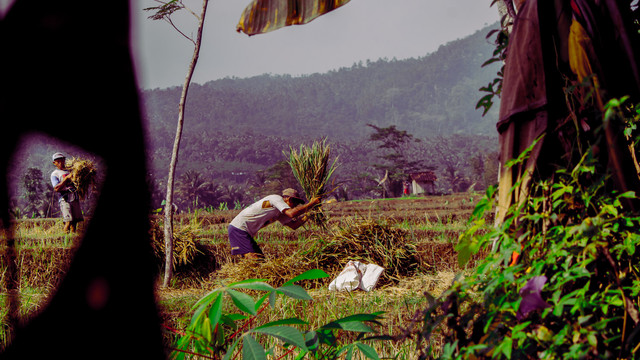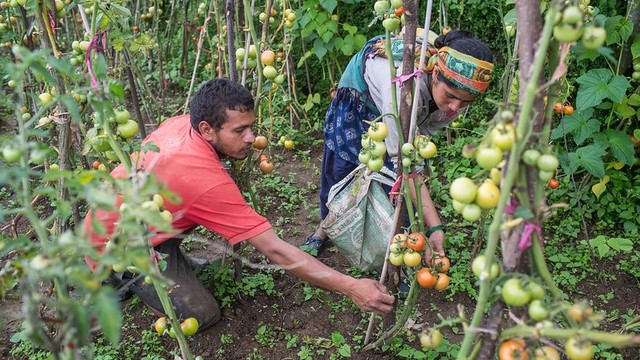Just transition litigation: a tool for more just and sustainable economies
Guest bloggers Maria Antonia Tigre and Natalia Urzola share findings from just transition litigation cases in Latin America challenging unjust and unequal energy transitions required for decarbonisation. Their findings highlight how this legal strategy can achieve more equitable outcomes from policies and actions intended to move us towards net zero and climate-resilient societies.



A member of the Wayúu community. This Indigenous community filed a lawsuit against the Ministry of Environment in Colombia (Photo: ACDI VOCA/David Osorio via Flickr, CC BY-NC-ND 2.0)
The concept of a ‘just transition’ – shifting towards green and sustainable economies in ways that are as fair and inclusive as possible for all concerned – is gaining traction with policymakers and investors globally. Among others, Savaresi and Setzer define a ‘just transition’ as fairly distributing both benefits and burdens arising from energy transition policies and activities when moving away from fossil fuels. However, transitions can also be ‘unjust’, resulting in the unequal – if unintentional – distribution of burdens.
Many communities affected by unequal transition initiatives are now challenging them using just transition litigation. A subset of climate litigation, just transition litigation is a relatively new movement. Cases started in 2016 as countries began to encourage, promote and adopt policies and projects for decarbonisation. In Latin America in particular – which is already a fertile hub for rights-based climate litigation – just transition litigation cases are on the rise.
A recent report by the Sabin Centre for Climate Change Law analysed 20 just transition litigation cases in Latin America. This blog provides an overview of the cases, including examples of the main arguments invoked by litigants. Importantly, the cases reviewed are not necessarily pro- or anti-climate action. Instead, they question whether decarbonisation strategies and policies are just and inclusive, particularly for the most vulnerable.
Role of human rights law in just transition litigation cases
Just transition litigation cases rely on human rights law to challenge initiatives (projects or laws) adopted for energy transition. Of the 20 cases analysed, 17 invoked the right to a healthy environment as instrumental in the energy transition. Plaintiffs also invoked other human rights threatened by energy transition measures, including the rights to life, health, dignity, food and housing, among others. Plaintiffs often used a combination of these rights to support and give context to their claims.
Significantly, these cases did not question the legitimacy of energy transition initiatives. Instead, the plaintiffs questioned if and how just transition principles or dimensions were considered. Questions included those related to the participation of affected communities, the reintegration of workers in fossil fuel industries into the renewable energy sector, and if and how Indigenous communities were properly informed of impacts or included in decision-making processes.
Principles of justice in just transition litigation
Also central to just transition litigation cases are the principles of distributive, procedural and restorative justice. The following examples demonstrate how these notions of justice are used in just transition litigation – and highlight the emerging but hugely significant trend of how the voices of Indigenous groups are growing in climate litigation.
Distributive justice
Distributive justice refers to the fair distribution of benefits and resources among society members, protecting and empowering those most affected by just transition policies and decisions. The notion of distributive justice is consistent with broader trends in global climate litigation and in cases related to rights and intergenerational equity, which question how the unfair burdens of climate change are being imposed on children and future generations:
- In the case of Idheas Litigio Estratégico v Centro Nacional de Control de Energía (CENACE) and Secretaría de Energía (SENER), the Mexican Center for Environmental Law and Greenpeace challenged a series of regulations made by the Mexican government that would increase the use of fossil fuels and impede the energy transition. The plaintiffs argued that more emissions today would jeopardise sustainable futures for future generations.
- In the case of Wayúu Indigenous community v Ministry of Environment and others in Northern Colombia, the plaintiffs questioned the unfair allocation of burdens a climate-altering coal mining project would create. As a marginalised and affected community, they invoked the correlation between coal mining and GHG emissions to request the mine’s closure, to ensure the transition towards cleaner energy and compliance with Colombia’s international commitments.
Procedural justice
Procedural justice includes ensuring the meaningful participation of those directly affected by energy transition decisions. Meaningful participation is supported by accepted human rights concepts and international legal principles, such as procedural rights to information and free, prior and informed consent (FPIC):
- The case of regional Government of Atacama v Ministry of Mining and Other in Chile is an example of both distributive and procedural justice and relates to the impacts of mining for resources required for energy transition, such as lithium. The plaintiffs argued that changes to government policies related to lithium mining were done without the meaningful public participation of Indigenous and local communities or assessment of environmental impacts, leading to negative impacts on biodiversity, water supplies, pollution levels and cultural heritage.
Restorative justice
Restorative justice means repairing and restoring any harm caused by transition policies and activities that interfere with the rights of people. Aspects of restorative justice tend to surface as judges and courts issue decisions. Since most of the 20 cases are still pending, we have yet to see how issues of restorative justice will be addressed.
Just transition litigation: neither pro- nor anti-climate action
Climate litigation cases are usually categorised as either pro (positively influencing climate and decarbonisation goals) or anti (limiting pro-climate laws and policies or advocating for business-as-usual). But just transition litigation cases do not neatly fit into either category. For example, the Latin America cases analysed for the study are not against climate action policies and laws per se.
But – if they are successful – they might have an anti-regulatory effect on energy transition. In seeking to ensure a fair transition, these cases might frustrate or (temporarily) stall pro-climate action.
Rather than being categorised as pro- or anti-climate action, just transition litigation should be recognised as an entirely new category of litigation that takes a more neutral approach that allows researchers to concentrate on the common threads underlining these cases: moving towards an energy transition that addresses issues of distributive, procedural and restorative justice as a tool for more just and sustainable economies.
Just transition litigation is still an under-researched area in legal academia. But its emergence is opening the field to a wide range of new questions and opportunities.
Our analysis of these Latin American cases provides a starting point for further research, both theoretical (further defining the scope and content of just transition litigation) and practical (expanding the empirical data on cases across a wider range of regions). Our findings show the value of careful analysis of the legal mechanisms available to citizens seeking to hold actors to account for a just transition to a greener, fairer society.



